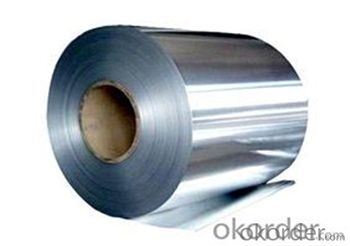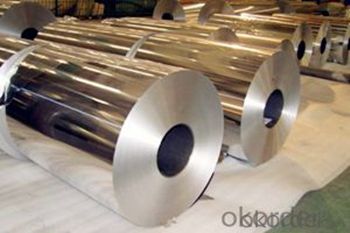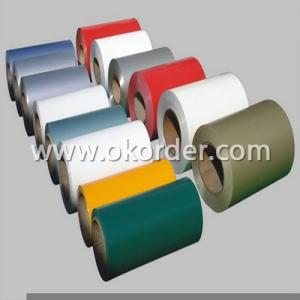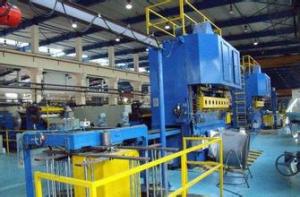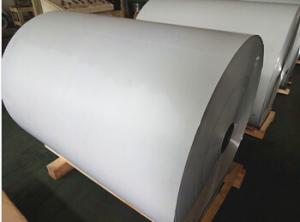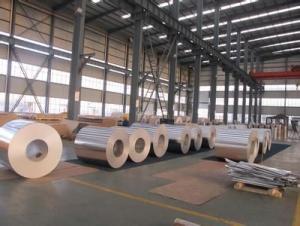High Quality Copper Aluminum Coil with a Good Price
- Loading Port:
- Qingdao
- Payment Terms:
- TT OR LC
- Min Order Qty:
- 10000 kg
- Supply Capability:
- 100000 kg/month
OKorder Service Pledge
OKorder Financial Service
You Might Also Like
Specification
Aluminum Coil
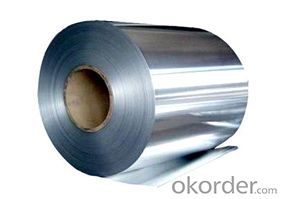
Product Description of Aluminum Coil
Aluminum ingots can be rolled to form aluminum coil end product. The aluminum coil is slit into desired width of aluminum sheet, aluminum strip by slitting cutter.
Classification of Aluminum Coil
The aluminum strip is the ribbon and it is made by the rolled aluminum ingots. Aluminum strip can be divided into various brands, specifications and states based on the different usages. The common brands are 1050, 1060, 1100, 3003, 8011 etc. There are two states exist, usually, we use O means soft state and H shows hard state, the numbers often follow after O and H to represent the degree of hardness and anneal.
Aluminum Coil Picture
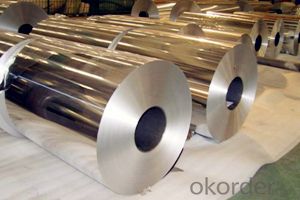
Application of Aluminum Coil
Aluminum strip can be widely used for aluminous-plastic composite pipe, cable, fiber optic cable, transformer, heater, window-blinds etc. Gongyi Aluminum Co.,Ltd. mainly produces aluminum strip for pipe and cable.
Introduction of our company
Our company is a professional Aluminium Strip manufacturer and Aluminum Circles manufacturers,mainly supply Aluminium Coil,Aluminum Circles,Aluminium discs,Aluminum Sheet,Aluminum Strip, Household Aluminum Foil,Aluminum Foil for Pharmaceutical Packaging,Aluminum Foil Tape,Aluminum Foil for Air Conditioner,Aluminum Foil for Container etc. series of aluminum products, sincerely welcome everyone to visit.
- Q: Can aluminum coils be used for decorative purposes?
- Yes, aluminum coils can be used for decorative purposes. They are commonly used in various decorative applications such as trim work, wall panels, ceilings, and decorative accents. Aluminum coils offer versatility in terms of color, texture, and finish, allowing for creative and aesthetically pleasing designs.
- Q: Can aluminum coils be used in telecommunications infrastructure?
- Yes, aluminum coils can be used in telecommunications infrastructure. Aluminum is a lightweight and durable material that is commonly used in various industries, including telecommunications. The use of aluminum coils in telecommunications infrastructure offers several advantages. Firstly, aluminum is a cost-effective material compared to other metals like copper. It is readily available and has a lower price point, making it a preferred choice for many telecommunications companies. Additionally, aluminum coils are lighter in weight, which makes them easier to handle and install, reducing the overall labor and transportation costs. Moreover, aluminum has excellent electrical conductivity, making it suitable for transmitting data signals in telecommunications networks. Aluminum coils can effectively carry electrical current, ensuring efficient data transmission without any significant loss in quality. This conductivity enables reliable and high-speed communication over long distances. Another advantage of using aluminum coils in telecommunications infrastructure is their resistance to corrosion. Aluminum naturally forms a protective oxide layer when exposed to air, preventing it from rusting or corroding easily. This resistance to corrosion ensures the longevity and durability of the infrastructure, reducing maintenance and replacement costs over time. However, it is important to note that aluminum has a lower tensile strength compared to copper. Therefore, proper engineering and design considerations need to be taken to ensure the structural integrity of the infrastructure when using aluminum coils. Additionally, specific connectors and hardware compatible with aluminum may be required. In conclusion, aluminum coils can be effectively used in telecommunications infrastructure due to their cost-effectiveness, lightweight, electrical conductivity, and resistance to corrosion. Proper planning and design are necessary to ensure the successful implementation of aluminum coils in telecommunications networks.
- Q: What are the different coil transportation options for aluminum coils?
- There are several different coil transportation options available for aluminum coils. 1. Flatbed Trucks: Flatbed trucks are commonly used for transporting aluminum coils. These trucks have an open top and are equipped with a flat, open trailer bed. The coils are securely strapped or banded onto the bed to prevent any movement during transportation. 2. Coil Racks: Coil racks are specialized transportation equipment designed specifically for carrying aluminum coils. These racks are usually made of steel and are placed inside a truck or trailer. The coils are stacked on the racks, which have dividers to keep them in place and prevent any shifting or damage. 3. Coil Trailers: Coil trailers are trailers that are specifically designed for transporting aluminum coils. These trailers have a unique coil cradle system that securely holds the coils in place during transportation. The cradles are adjustable to accommodate different coil sizes and prevent any movement or damage. 4. Container Shipping: Aluminum coils can also be transported using shipping containers. The coils are loaded into the containers and secured using straps or bracing. This option is commonly used for international transportation, as containers can be easily loaded onto ships or trains. 5. Rail Transport: Rail transport is another option for transporting aluminum coils. Specialized rail cars, known as coil cars, are used for this purpose. These cars have cradles or racks built into them to securely hold the coils during transit. Rail transport is often used for long-distance transportation, as it is a cost-effective and efficient method. Overall, the choice of coil transportation option depends on factors such as distance, cost, and the specific requirements of the coils being transported.
- Q: Can aluminum coils be used in the production of electrical enclosures?
- Yes, aluminum coils can be used in the production of electrical enclosures. Aluminum is a popular choice for manufacturing electrical enclosures due to its excellent conductivity, lightweight nature, and corrosion resistance. The use of aluminum coils allows for the production of seamless and sturdy enclosures, ensuring efficient heat dissipation and protection for electrical components. Additionally, aluminum coils can be easily molded and formed into various shapes and sizes, providing flexibility in design. Overall, the use of aluminum coils in the production of electrical enclosures is a reliable and cost-effective solution.
- Q: What are the various applications of aluminum coil in the construction industry?
- <p>Aluminum coil is widely used in construction for various purposes due to its lightweight, durability, and corrosion resistance. It is commonly used in roofing and siding materials for both residential and commercial buildings, providing a long-lasting and low-maintenance option. Aluminum coil is also utilized in the manufacturing of window frames and doors, offering thermal efficiency and strength. Furthermore, it is used in the production of heat exchangers, solar panels, and electrical wiring due to its excellent conductivity. Additionally, aluminum coil is employed in the fabrication of scaffolding and structural components, contributing to the overall stability and safety of construction projects.</p>
- Q: Will the surface of the aluminum sheet touch the water?Aluminum rolls weighing 3.463 tons,.35mm thick, 900mm wide, very tight coil, is a mechanical binding. Water does not penetrate the surface of aluminium rolls
- Do you want to ask if the water has seeped into the crevice?If you get it soon, there should be no problem. No, you can just sun it and see if there's any water coming out of it
- Q: This question asks for methods to take care of and preserve aluminum coils, ensuring their longevity and functionality.
- <p>To maintain aluminum coils, follow these steps: Keep them clean by wiping off any dust or debris. Store them in a dry environment to prevent corrosion. Avoid stacking heavy objects on top to prevent deformation. Regularly inspect for any signs of damage or wear. Use appropriate handling equipment to avoid scratches or dents. Apply a protective coating if exposed to harsh conditions. Ensure proper ventilation during storage to prevent condensation. By following these practices, you can prolong the life and maintain the quality of aluminum coils.</p>
- Q: When they say to coat entire roof system with Aluminum coating, what does that mean? The area to coat is NOT the ceramic barrel tiles of a roof but the flat section covered with tar paper and granules of shiny sand. Is it a liquid? Clear? Good for the roof.? How is it applied?
- Why you would be coating a flat roof with Aluminum coating is beyond anything I have learned. Flat roofs should have a felt and tar coating to water proof them. Aluminum roof coating is used mostly on mobile homes to reflect heat because mobile homes don't have attics to trap the heat and carry it to vents. It also seals the water out at the metal seams. Aluminum coating is a type of polymer that has aluminum flakes in it. It is brushed on like a thick coat of paint and allowed to dry.
- Q: Can aluminum coils be used for signage and display applications?
- Yes, aluminum coils can be used for signage and display applications. Aluminum is a versatile material that is lightweight, durable, and resistant to corrosion, making it an ideal choice for various signage and display purposes. Its flexibility allows for easy shaping and customization, while its smooth surface provides a perfect canvas for printing graphics and designs. Additionally, aluminum coils can be easily mounted, making them suitable for both indoor and outdoor signage and displays.
- Q: What are the different types of edge conditions for aluminum coils?
- There are several different types of edge conditions for aluminum coils, each serving a specific purpose and application. These edge conditions are designed to provide protection, enhance functionality, and ensure compatibility with various manufacturing processes. 1. Mill Edge: This is the standard edge condition produced during the initial rolling process at the mill. It is characterized by a smooth, straight, and burr-free edge. Mill edge coils are suitable for general applications and can be easily processed further. 2. Slit Edge: Slit edge coils are created by cutting the mill edge coils into narrower widths. This process removes a small strip of material along the edges, resulting in a slightly rougher edge compared to mill edge coils. Slit edge coils are commonly used in applications where precise width tolerances are required. 3. Trimmed Edge: Trimmed edge coils undergo further processing to remove irregularities or defects along the edges. This edge condition is achieved by shearing or trimming the coil to eliminate any imperfections. Trimmed edge coils are often used in applications that demand a high level of aesthetics or require a uniform appearance. 4. Deburred Edge: Deburring is a process that involves removing any sharp edges or burrs from the coil. This edge condition is achieved through mechanical or chemical methods, ensuring a smooth and safe edge. Deburred edge coils are commonly used in applications where safety is a concern, such as in the manufacturing of consumer goods. 5. Rounded Edge: Rounded edge coils have their edges rounded or softened to reduce the risk of injury during handling or installation. This edge condition is achieved through a variety of methods, including roll forming or edge rolling. Rounded edge coils are often used in applications where safety is paramount, such as in the construction industry. 6. Specialty Edge Conditions: In addition to the standard edge conditions mentioned above, there are also specialty edge conditions available for specific applications. These may include edge conditions designed for specific manufacturing processes like welding, bending, or forming. Specialty edge conditions are tailored to meet the unique requirements of certain industries or applications. It is important to select the appropriate edge condition for aluminum coils based on the specific requirements of the application. Factors such as aesthetics, functionality, safety, and manufacturing processes should all be considered when determining the most suitable edge condition.
Send your message to us
High Quality Copper Aluminum Coil with a Good Price
- Loading Port:
- Qingdao
- Payment Terms:
- TT OR LC
- Min Order Qty:
- 10000 kg
- Supply Capability:
- 100000 kg/month
OKorder Service Pledge
OKorder Financial Service
Similar products
Hot products
Hot Searches
Related keywords


